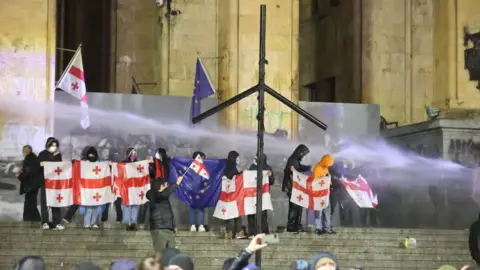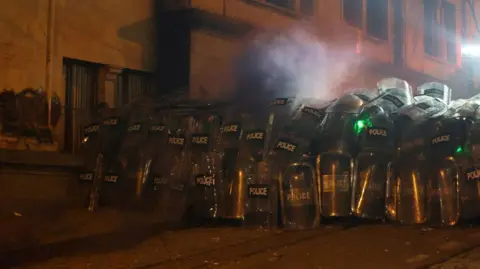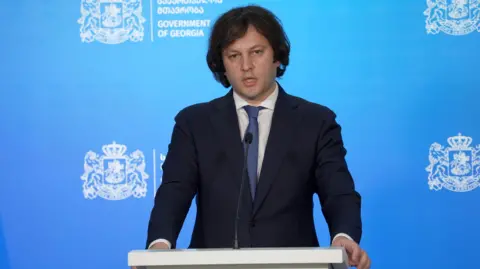Georgia’s Prime Minister Kobakhidze takes responsibility as protests intensify and resignations

 Getty Images
Getty ImagesGeorgia has seen a fourth night of street protests and a string of public resignations, triggered by the ruling party’s decision to halt the push to start negotiations to join the European Union.
As tens of thousands of Georgians returned to the streets of several cities, Prime Minister Irakli Kobakhidze said they had fallen prey to the opposition’s lies and rejected calls for new elections.
He confirmed reports that Georgia’s ambassador to the US, David Zalkaliani, has become the latest top diplomat to resign, explaining that he was under great pressure.
But Kobakhidze wanted to deny the reason for the protest, saying on Sunday “we haven’t stopped anything, it’s a lie”.
Just three days earlier, his party Georgian Dream had accused the EU of using negotiations to join the union as “blackmail” and said the government had decided not to put the issue on the agenda until the end of 2028.
Pro-EU protesters came out in large numbers again on Sunday night, and when fireworks were aimed at the parliament building and riot police, the police responded with water cannons. Large groups of police swarmed the streets next to the parliament, until late at night when there were reports of clashes with protesters.
 GIORGI ARJEVANIDZE/AFP
GIORGI ARJEVANIDZE/AFPThe new Georgian government has been accused by the EU and the US of backsliding democracy. On Saturday, the US took an important step to freeze its relations with Georgia.
Kobakhidze emphasized that the Georgian Dream was “committed to the integration of Europe … and we continue our path to the European dream”.
However, many government officials do not seem to believe that this is the case. Several ambassadors resigned, and hundreds of civil servants and more than 3,000 teachers signed letters criticizing the decision to suspend EU accession.
 Anton Chicherov/BBC
Anton Chicherov/BBCMany Georgians are shocked by the level of violence against Georgian journalists and protesters. Dozens of journalists were beaten or pepper sprayed and some required hospital treatment.
Human rights ombudsman in Georgia Levan Ioseliani said “this is brutal”, and urged the police not to abuse their power.
The prime minister said that it was the opposition groups and not the police that unleashed “systematic violence”.
Former Georgian ambassador to the EU Natalie Sabanadze, now at Chatham House in the UK, believes that the level of violence, the series of resignations and civil disobedience show a “qualitative change” in the protests taking place now.
“It’s possible [the government] I thought people would be afraid, but it’s not like this,” he told the BBC. “Yesterday, civil society activists and artists went to public radio and took it by force and entered the radio live. I have seen this before, in pre-revolutionary Georgia [in 2003].”
Georgia’s pro-Western president, Salome Zourabichvili, will have to step down in a few weeks, but since last month’s parliamentary election, which the opposition has criticized as fraudulent, has become a common sight, rallying anti-government protesters and calling for a new vote.
He and the protesters accuse the government of aiming to drag their country into Russian territory, even though the majority of people are backing away from joining the EU.
Georgia has a population of about 3.7 million and 20% of its territory is controlled by the Russian military in two separate regions.
At noon on Sunday, a group of protesters entered the intersection at noon on Sunday in front of Tbilisi State University.
“I am here for the future of my country and the future of my three-year-old son,” said another protester named Salome, who is 29 years old. “I don’t want him to waste his life in protests and I don’t want him to.” the Russian government.”
While Georgian Dream has categorically denied any links to the Kremlin, last year it adopted Russian-style laws targeting civil society organizations on foreign funding and LGBT rights.

Half an hour’s walk from the midday protest, a small army of cleaners was trying to remove graffiti from the wall in front of the Georgian parliament.
Some of the building’s windows were smashed on Saturday night, and an effigy of Bidzina Ivanishvili, a billionaire considered to be the driving force behind the Georgian Dream’s 12-year rule, was burned.
The question now is what will happen next in Georgia’s political and constitutional crisis.
The relationship of the Dream government of Georgia with its Western partners is very visible.
The EU’s new foreign policy chief, Kaja Kallas, warned on Sunday that the government’s actions “will have direct consequences on the EU side”, and America’s decision to freeze its strategic relationship will be widely felt.
The prime minister of Georgia had little time for the president or his bid for new elections.
“Mrs Salome Zourabichvili has four Fridays [as president] and he can’t get used to it. I understand his emotional state, but on the 29th of December he will have to go.”
Source link




